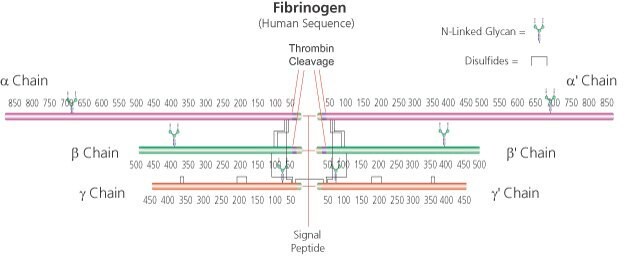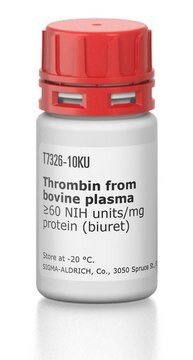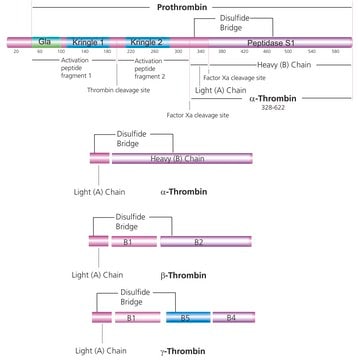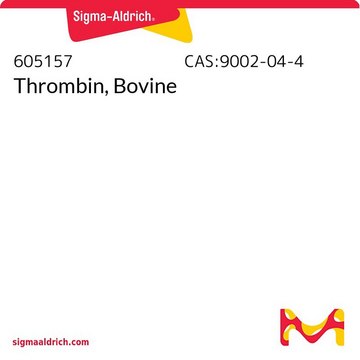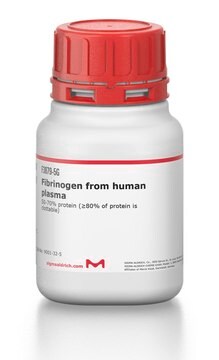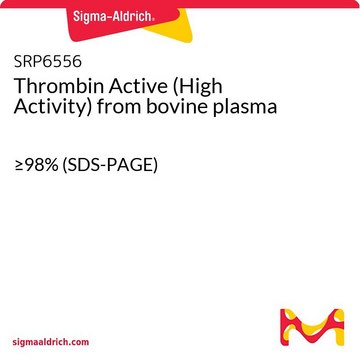おすすめの製品
由来生物
bovine plasma
品質水準
フォーム
lyophilized powder
比活性
40-300 NIH units/mg protein (biuret)
分子量
heavy chain ~33 kDa
light chain ~5 kDa
組成
Protein, 40-60%
UniProtアクセッション番号
輸送温度
wet ice
保管温度
−20°C
遺伝子情報
cow ... F2(280685)
類似した製品をお探しですか? 訪問 製品比較ガイド
詳細
トロンビンは、止血に関する最終的な凝固プロテアーゼであり、凝血促進と抗凝血効果の両方を促進します。
アプリケーション
トロンビンは、アフィニティタグの除去のためのアクセス可能なトロンビン認識部位を含む、リコンビナント融合タンパク質の部位特異的切断に使用されます。トロンビンは、敗血症性ショック患者における、持続的凝血能低下の評価に関する研究に使用されています。
生物化学的/生理学的作用
Arg-Glyを選択的に切断するセリンプロテア-ゼは、フィブリノ-ゲン内に結合し、フィブリンおよびfibrinopeptide A、Bを形成します。
単位の定義
活性は、NIHトロンビン参照標準品であるロットKと直接比較して得られたNIH単位で表されます。
物理的形状
塩化ナトリウムおよびpH 7.0のTris-HClを含有する凍結乾燥品
調製ノート
ウシ脳トロンボプラスチンを用いて活性化
アナリシスノート
NIHのアッセイでは、Biggs法の変法に基づいて、トロンビンサンプル(1%バッファ-アルブミン溶液で安定化)0.1 mLと、基質として希釈血漿(同量の生理食塩水で希釈)0.2 mLを用います。 凝固時間15~25秒の範囲でトロンビン濃度を決定します。
活性は、NIIHトロンビン標準品(ロットK)との直接比較によって得られたNIH単位で表しています。
その他情報
より詳細な情報につきましては、www.sigma-aldrich.com/enzymeexplorerのthrombinをご覧ください。
インヒビター
シグナルワード
Danger
危険有害性情報
危険有害性の分類
Eye Irrit. 2 - Resp. Sens. 1 - Skin Irrit. 2 - STOT SE 3
ターゲットの組織
Respiratory system
保管分類コード
11 - Combustible Solids
WGK
WGK 2
引火点(°F)
Not applicable
引火点(℃)
Not applicable
適用法令
試験研究用途を考慮した関連法令を主に挙げております。化学物質以外については、一部の情報のみ提供しています。 製品を安全かつ合法的に使用することは、使用者の義務です。最新情報により修正される場合があります。WEBの反映には時間を要することがあるため、適宜SDSをご参照ください。
Jan Code
T4648-1KU:
T4648-BULK:
T4648-100KU:
T4648-VAR:
T4648-10KU:
この製品を見ている人はこちらもチェック
Persistent hypocoagulability in patients with septic shock predicts greater hospital mortality: impact of impaired thrombin generation
Massion, P., et al.
Intensive Care Medicine, 1823(8), 1316-1323 (2012)
Marek R Baranowski et al.
Nucleic acids research, 48(15), 8209-8224 (2020-06-10)
The high sensitivity of 19F nucleus to changes in the chemical environment has promoted the use of fluorine-labeled molecular probes to study structure and interactions of nucleic acids by 19F NMR. So far, most efforts have focused on incorporating the
Adam M Jorgensen et al.
Tissue engineering. Part A, 26(9-10), 512-526 (2019-12-22)
Over 1 million burn injuries are treated annually in the United States, and current tissue engineered skin fails to meet the need for full-thickness replacement. Bioprinting technology has allowed fabrication of full-thickness skin and has demonstrated the ability to close
Navid Hakimi et al.
Lab on a chip, 18(10), 1440-1451 (2018-04-18)
We present a handheld skin printer that enables the in situ formation of biomaterial and skin tissue sheets of different homogeneous and architected compositions. When manually positioned above a target surface, the compact instrument (weight <0.8 kg) conformally deposits a
Suping Li et al.
Nature biotechnology, 36(3), 258-264 (2018-02-13)
Nanoscale robots have potential as intelligent drug delivery systems that respond to molecular triggers. Using DNA origami we constructed an autonomous DNA robot programmed to transport payloads and present them specifically in tumors. Our nanorobot is functionalized on the outside
ライフサイエンス、有機合成、材料科学、クロマトグラフィー、分析など、あらゆる分野の研究に経験のあるメンバーがおります。.
製品に関するお問い合わせはこちら(テクニカルサービス)